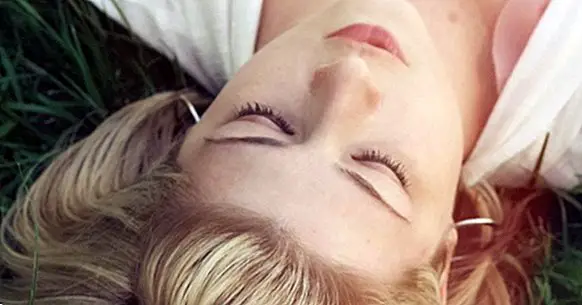Tips to sleep well and beat insomnia
When we think of sleep difficulties probably the first thing that comes to mind is the word "insomnia". But sleep disorders are not reduced only to insomnia but this is the problem related to the most prevalent sleep in our society.
Then read some tips to sleep well of very simple application. These measures to get a good rest are known as "sleep hygiene".
The problem of insomnia
Insomnia is a disorder that can affect all ages and affects both men and women, although it is more prevalent in them, especially after the climacteric.
In our society the vast majority of people rest little and badly , concretely Spaniards slept an average of 40 minutes less than the rest of Europeans. This is largely due to our nocturnal schedules, a trend we share with Argentina and other countries in Latin America.
Around 40% of the population suffers from sleep problems , in fact it is estimated that we lose around 480 hours of sleep per year.
The consequences of not resting
Sleeping is a necessity, in fact if a person did not sleep at all, they would die within a period no longer than 7 days. People who fail to rest well in the short term are adversely affected their physical, mental and emotional health and, in fact, are 40% more likely to suffer a traffic accident.
The most important repercussions of the lack of rest are the increase of accidents (traffic and work), affect on mood and behavior problems , as well as the ability to concentrate and retain information, which leads to school failure. Aging also accelerates, the libido decreases and it will be more difficult for us to lose weight.
- Maybe you're interested: "Avoid the effects of insomnia with these 5 basic keys"
Elements that harm sleep hygiene
It is clear that sleep is not only important, it is essential, and although we know it is a necessity It is also a habit subject to certain routines . If we abandon or change these routines, the habit of sleeping may be harmed.
Stress, obesity and sedentary lifestyle are three factors that negatively affect rest, so Adopt a healthy lifestyle and keep stress at bay they will favor our rest and will have an impact on greater health and well-being.
There are specialists in sleep medicine who can help us when you have tried everything to sleep, without success. However, most people who come to a specialized sleep unit do so because of insomnia caused by bad habits, which they can be easily corrected with the so-called "sleep hygiene" . Sleeping is something that occupies us the third part of our life, so let's do it well.
Hours needed for rest
The number of hours a person needs to have a restful sleep is very relative, depends on genetic factors and the age of the individual . The number of hours needed to rest ranges from 5 or 6 to 9 or 10 hours of sleep.
To know the hours of sleep you need you can:
- Add the hours you sleep during the week and divide by 5.
- Add the hours you sleep on the last three weekends and divide by 6.
- Compare; the results must be balanced, otherwise we are subtracting hours of sleep on work days.
Substances that sabotage rest and substances that promote it
Be awake or asleep is related to the presence or absence of certain chemicals in the brain ; during the day, catecholamines such as adrenaline and hormones such as cortisol (our biological alarm) keep us awake. At night these chemical messengers descend and melatonin is generated, which helps us to rest.
This chemical balance can be altered by other chemical substances that we introduce into our bodies, for example through diet. Caffeine is an example . In addition to chemicals, regularity in meals, body temperature and exposure to sunlight also modulate the sleep-wake cycle.
They sabotage rest
Coffee, tea, mate, cola, tobacco and alcohol increase the chances of suffering from insomnia, in addition to gastritis and other digestive problems.
The case of caffeine
Any disease related to stress will be aggravated by the use of caffeine, so in these cases it is necessary to avoid it. The best time to take caffeine is during breakfast and should be removed from noon.
The effects of caffeine persist in the body more or less hours depending on the individual, and may extend beyond seven hours.Excessive consumption increases the risk of palpitations, chest pains and coronary heart disease.
Although it is a very accepted substance, commonly used in our society and apparently innocuous, we must not forget that, like alcohol, if it is not used properly, it can lead to addiction problems , with its corresponding abstinence syndrome.
Chocolate and soft drinks add to their addictive potential not only high amounts of caffeine, but also high sugar.
The case of alcohol
Alcohol, contrary to what is popularly thought, also hinders sleep because although it is true that one falls asleep more easily when consuming alcohol, the rest is fragmented and unrefreshing, because it prevents reaching the phases of deep sleep and also impairs REM sleep (paradoxical dream, in which memory is consolidated). Avoid alcohol in the three or four hours before bedtime.
- Related article: "The 5 phases of sleep: from slow waves to REM"
Other substances
Nicotine, marijuana, cocaine and amphetamines They also impair sleep, in addition to other harmful effects on health. These last ones, in addition, can favor the appearance of nightmares. There is also a long list of medications that can alter sleep, these are just some of them: antidepressants, antihypertensive, antiasthmatic, oral contraceptives.
Substances that help to sleep well
Tryptophan is the natural precursor of serotonin , a neurotransmitter essential for good psychic functioning.
We can add tryptophan in our diet, especially at dinner. We will find it in eggs, ham, poultry meat, blue fish, dairy products (a natural sedative) and to a lesser extent in rice, barley, wheat, bread, pasta and tapioca, also in potatoes, cabbage, pumpkin and nuts.
Vitamin B6 helps the metabolism of tryptophan, is present in eggs and all kinds of meat and fish, so including these foods at dinner can help us rest .
Complex carbohydrates such as potatoes, squash, rice and pasta also promote sleep. If you are a vegetarian you can substitute tofu or nuts for meat. Tila, verbena, camomile, valerian or passionflower can also be useful , in infusion or in grajea. An aromatized bath or a massage with essential oils can also help to relax and induce sleep.
Awakenings
People who are following a diet sometimes they get up at night because of hunger because they are eating foods low in sugar (they have a hypoglycemia). To prevent hunger from waking us up we can eat a small sandwich before going to sleep, although it is better not to hurry when it comes to reducing our weight: slowly but surely. If the raids to the refrigerator are very repeated, it may be a psychological problem that requires more specialized treatment.
Sleeping with the television or radio on can also wake us up. There are people who say that this helps them sleep, but this is inadvisable: the noise, light and radiation that the television emits disturbs and fragments our sleep.
We will not leave furniture or objects with which we may stumble in our passage between the bed and the bathroom, and on cold nights we will have a blanket, quilt or thick socks at hand so that if we need it, we will not clear up looking for it at midnight.
Keep in mind that drinking too much water can make it easier for us to get up to go to the bathroom.
The bedroom and the bed
The bedroom must be the sanctuary of the dream, must have a comfortable bed and it is advisable to change the mattress every ten years. The silence, the darkness and an ideal temperature for rest (that which is between 18 and 22 º), will facilitate the dream.
The bedroom furniture and the activities carried out in it are much more important than many believe. In the bedroom is enough to have a bed and little more than that, work desks, music devices, televisions and other furniture or appliances that are not intended for rest are over.
Ideally, we will limit our activity in the bedroom to the act of sleeping or making love, it is very important that these are the only activities we do in bed, because if we do other things such as watching television, listening to music, eating, studying, surfing by internet ... we confuse our brain and we break with the unconscious associations that help you automate the act of getting into bed and sleeping.
We can listen to soft music or read a little before sleeping , but this should not be done in the bedroom and in no case we will do it in bed, we will not listen to the last CD of our favorite group of heavy metal nor will we do a dense or especially stimulating reading.
Avoid watches, put the alarm clock face to the wall. Make your bedroom a timeless space.
Some remedies for noise are to use Earplugs, thick curtains, carpets or carpets , double glass in the windows and in extreme cases cork in the walls or anti-noise plates.
Before sleep
From 18:00 we must disconnect from work, and perform light exercise in the three hours before dinner. Never intense exercise (this is better in the morning), because it increases the body temperature and this clears us. Dinner must be light , we can introduce food facilitators of sleep, ideally we will have dinner two hours before going to bed.
Avoid drinking alcohol and copious dinners; Especially when the heat tightens, it is a factor that hinders sleep. On particularly hot nights it is possible to put a cover of a pillow a few minutes in the fridge before bedtime.
In the two hours before bedtime we can schedule the next day, but we must not exceed more than 15 minutes, it is about reviewing the agenda, not going to work. We can make a list of issues that concern us or pending tasks and forget about all that until the next morning.
In this time before going to sleep you have to avoid arguing, sticking to a TV show or a movie that ends late. It is also convenient to set an hour to turn off the computer , the exposure to the blue lights that emit the devices with screen as the telephone, the television or the computer sends signals to our brain that make him think that it is by day. There is free software, f.lux, that eliminates these blue lights.
Carry out relaxation techniques It will help reduce the tension accumulated during the day. Regular schedules and sleep-inducing rituals will help us send signals to our brain that tell you that bedtime is approaching.
- Related article: "6 easy relaxation techniques to combat stress"
Other tips to sleep well
To enjoy good sleep hygiene, follow these other tips.
1. Sleep-inducing rituals
Each animal species has its specific rituals for sleep, dogs spin around themselves on what will be their bed, human beings sleep in bedrooms: a specific area in our home dedicated to sleep, and we like it to be always the same .
We can also practice certain rituals: put on our pajamas, brush our teeth, drink a glass of milk, read for a while ... are actions that we do every day (we can skip it one day, but this must be the exception and not the norm).
As an example, we can use as rituals:
- Turn off the television, run curtains, prepare clothes for the next day, prepare the table for breakfast, lower the trash, walk the dog, go to the bathroom ...
- Go to sleep when you are sleepy, ideally we go to sleep always at the same time, the brain of an adult is scheduled for that time between 11 and 1 in the morning.
- Schedule regular schedules to go to sleep and get up, even on weekends.
- Do not toss and turn in bed
In line with the above, if after 10-15 minutes we do not fall asleep we will get up, We will go to another part of the house to do something monotonous and boring until we enter sleep and then we will try again. Surely it will have an effect, but if not, we will repeat the process, avoiding tossing and turning in bed without sleeping. The bed is to sleep, not to go around thinking "I can not sleep".
2. Sleep medication
Sleeping medication (hypnotics) are very useful if used correctly, but this always implies the supervision of a professional , employment limited in time and the appropriate dose. These drugs cause tolerance and dependence, this means that badly used are a remedy that instead of solving the problem aggravates it (and can complicate things a lot).
3. Naps
The nap is recommended if it is done between 2 and 4 in the afternoon and does not extend beyond 20 minutes, ideally it will be done 8 hours after waking up in the morning . If you suffer from insomnia, you have to avoid it.
4. Insomnia and mental disorders
It is known that anxiety disorders and mood disorders (such as depression or bipolar disorder) are closely related to the quality and quantity of our sleep, so much so that when our rest breaks down, the disorder worsens and, similarly, when we rest better, the disorder subsides.
A final clarification
All these guidelines are useful for people who suffer from transient insomnia because of bad habits related to sleep, for people suffering from insomnia as a symptom of a more complex symptom picture this may be useful but insufficient, in these cases it may be required the help of a professional to treat the primary problem.
Bibliographic references:
- Estivill, E & Averbuch, M .. (2006). Recipes to sleep well. Barcelona: Plaza & Janes Editores.



















